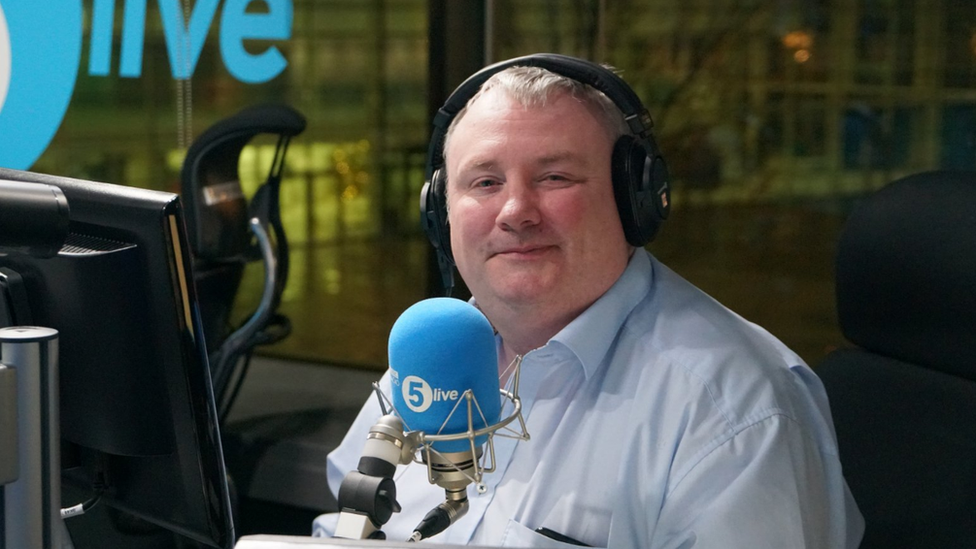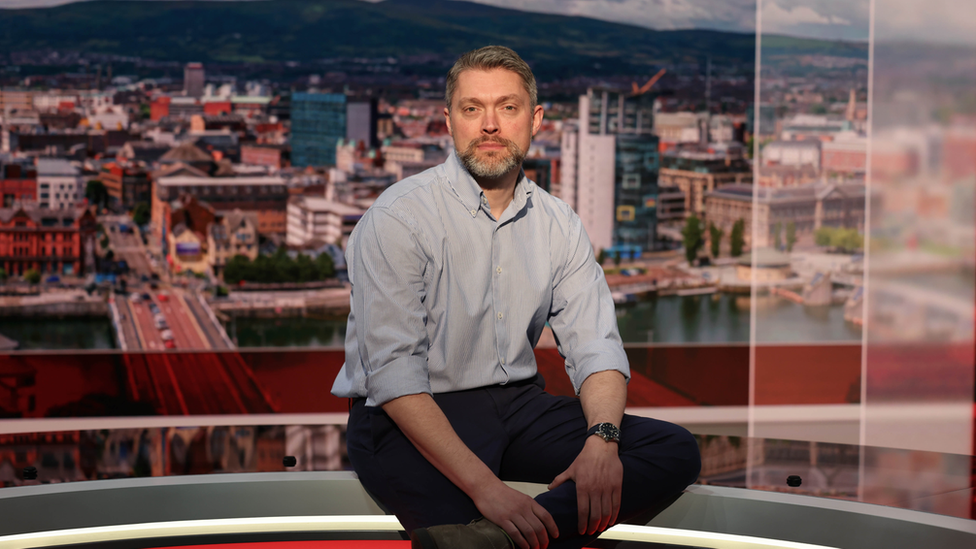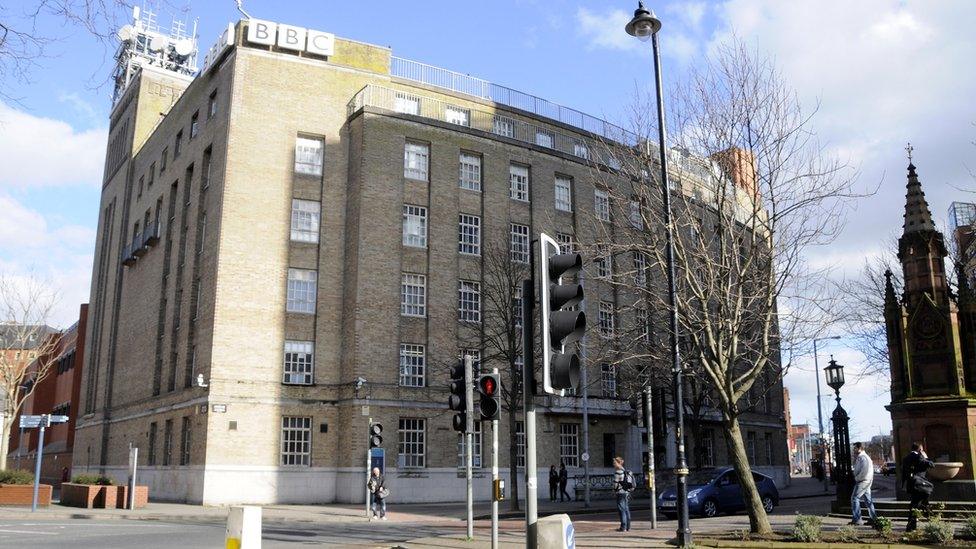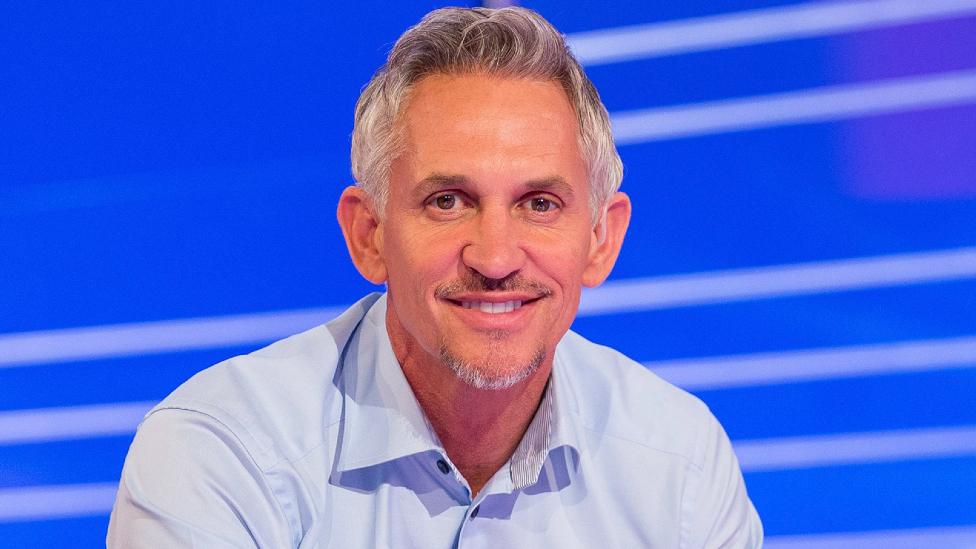Stephen Nolan remains BBC's fifth highest paid presenter
- Published

Stephen Nolan presents programmes on Radio Ulster and BBC 5 Live as well as some television work
The BBC presenter Stephen Nolan was paid between £400,000 and £404,999 directly from the licence fee in 2022-23.
That is according to the BBC's just-published annual report.
Mr Nolan's pay was for his presenting work on Radio Ulster, 5 Live and Nolan Live on BBC Northern Ireland.
His salary made him the 5th best paid BBC on-air presenter behind Gary Lineker, Zoe Ball, Alan Shearer and Huw Edwards.
But the 2022-23 pay figures do not include what Mr Nolan earns for other TV programmes made for the BBC by his independent production company.
In 2021-22 he earned between £415,000 and £419,999 directly from the licence fee.
The BBC's annual report gives the pay details of its top earning presenters and other staff who earn more than £150,000 from the licence fee in the year.
However, the figures in the report also do not include payments to presenters for other programmes made by independent production companies.
Therefore the salaries list does not include all presenters and actors because the corporation's commercial arm BBC Studios, which makes many programmes, also does not have to publish its spending on pay.
So for example, the salaries of presenters for programmes like Strictly Come Dancing - made by BBC Studios - or The Graham Norton Show, made for BBC One by his commercial company So Television, are not listed.

BBC NI director Adam Smyth was paid less in 2022-23 than his predecessor
The accounts also indicate that BBC Northern Ireland's interim director Adam Smyth was paid less in 2022-23 than his predecessor Peter Johnston.
Mr Smyth was appointed director of BBC Northern Ireland in April 2023 after being in post as interim director since January 2022.
The report publishes the salaries of BBC Executives paid more than £178,000 from the licence fee.
Mr Smyth's salary is not published which indicates he earned less than £178,000 in 2022-23.
His predecessor as Northern Ireland director Peter Johnston was paid just under £200,000 a year.
In his new role as the BBC's Director of Editorial Complaints and Reviews Mr Johnston saw his pay rise to between £200,000 and £204,999 in 2022-23.

BBC NI audiences remain large, the annual report says
Apart from Mr Nolan, there are no other BBC Northern Ireland presenters or staff named in the annual report as earning more than £150,000.
The annual report also reveals that BBC audiences remain large in Northern Ireland compared to other parts of the UK but have fallen in the past year.
Around 84% of adults used BBC TV or iPlayer, radio or online services in 2022-23, down from 91% in 2021-22.
However, the proportion of adults in Northern Ireland using BBC online services like BBC Sounds or iPlayer rose.
But there was a fall in the proportion who watched BBC TV News for Northern Ireland, from 48% in 2021-22 to 43% in 2022-23.
Fewer adults, on average, also listened to BBC radio each week then in 2021-22.
BBC NI 'faces challenges'
Just over half of adults (53%) in Northern Ireland felt that the BBC was "effective at reflecting people like them" - down from 57% the previous year.
In her comments in the report, the interim chair of the BBC Elan Closs Stephens said the BBC in Northern Ireland had faced "challenges" during the year.
"The repositioning of Radio Foyle's work as part of wider structural and scheduling changes led to some concerns," she said.
News programmes on BBC Radio Foyle, including the station's Breakfast Show, have been reduced by the BBC.
Ms Closs Stephens said the changes and their impact would be kept under review.
But the annual report also revealed that the BBC had increased the amount of money it had spent in Northern Ireland making TV programmes for the BBC Network.
Production of programmes like the BBC One police drama Blue Lights meant that the BBC spent £38m on network TV programmes in Northern Ireland in 2022-23 compared to £25m in 2021-22.
Related topics
- Published11 July 2023

- Published4 April 2023
